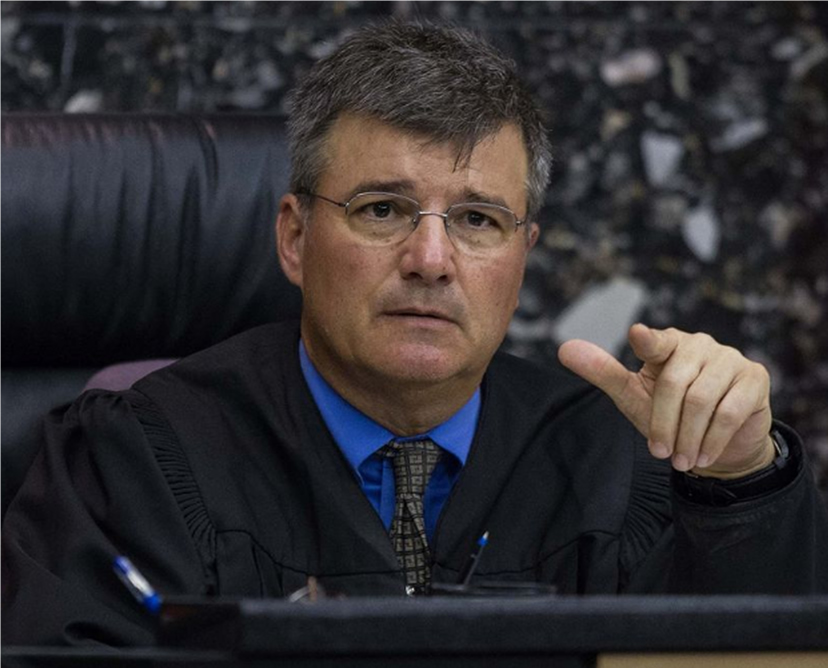
Florida’s 15th
Judicial Circuit –
Past Officials Flip-Flop on Justice



 Share This Article
Share This Article
 CLICK AND SUPPORT JAMIE CLARK!!! |
Jamie ClarkBy Edward Snook
Investigative ReporterPalm Beach County, FL - On Thursday, September 15, 2011, a jury of six women determined Jamie Clark to be guilty of DUI Manslaughter according to Florida Law. That law states any person who is "legally intoxicated" and "causes, or contributes to the cause of the death of another while operating a motor vehicle" shall be found guilty. If you believe in a strict sense that consuming alcohol and operating a vehicle is a crime, I strongly urge you to read this article.
The current judicial system in the United States would have you believe that in most cases, if you consume alcohol and operate a motor vehicle, you have broken the law - simple enough. Some states have even implemented new laws that specify if your blood alcohol level is under .08, you can still receive a DUI at the officer's discretion. As of 2011, all 50 States have adopted the .08 blood alcohol level-standard for determining when someone is "legally intoxicated".
What the United States judicial system rarely recognizes however, is that many times there are circumstances in which impairment and guilt, can and should be, called into question. For example, in a recent DUI Manslaughter case in Florida, an SUV driver who was over the legal limit made a left hand turn late at night. A motorcycle coming the other way was seen traveling 80-90 miles per-hour just moments before and ran into the side of the SUV as it turned. The cycle was determined to be engaged in a "wheelie" at the time, its headlight pointing into the sky, when it ran straight in the side of the other driver's car and literally up over the top of it, leaving tire tracks across the roof. The driver of the motorcycle was not wearing a helmet and was killed.
He was also found to be under the influence of alcohol. However, the jury in this case was allegedly never told about that fact. And, under Florida's DUI law where an individual "causes, or contributes to the cause,” the driver of the SUV was convicted of DUI Manslaughter. A court of appeals recently ruled that even though the driver of the SUV had been drinking, the evidence did not show him to have "caused or contributed to the death of the motorcycle driver" as required by law. "The appeals court ordered (Judge) Komanski to resentence the defendant for a lesser offense: DUI, which carries a maximum sentence of 12 months in jail."
According to the Orlando Sentinel newspaper, "The judge then revised the sentence he had originally imposed on a second charge, leaving the scene of an accident. He initially sentenced Pennington to 15 years of probation for leaving the scene. ...he made that 12 years of prison followed by 15 years of probation."
"Goerner (Defense Attorney) said case law prohibited a judge from ratcheting up a sentence on a charge unaffected by an appeals court ruling. The appeals court had explicitly affirmed Pennington's conviction and sentence on that count."
"But Assistant State Attorney Deborah Barra had argued that since Pennington had not yet begun serving that portion of his sentence, the judge was free to rework it." Defense attorney Goerner is filing an appeal on Judge Komanski's recent decision and it is this writer’s opinion that the judge abused his lawful authority, which should favor Goerner's appeal.
In the majority of these kinds of cases, it seems that even though the courts expect us to believe the evidence is always clear-cut and a jury trial will be the deciding factor, the real choice juries have to make is slowly being deteriorated through corrupt legal motions designed to exclude evidence from the jurors. These are commonly referred to as "Motions in Limine".
Some basic questions come to mind when one looks into the facts surrounding an alcohol-related vehicle accident. Questions such as: Who was involved? What caused the accident? How much alcohol was consumed? And, what did the responding law enforcement officers conclude? These are the types of queries that a prudent investigation should answer.
Next, I would like to state that I am not in any way an advocate for drinking and driving. However, I am an advocate for blind justice - the kind of justice that seeks to protect the innocent and punish the guilty.
Although laws are clearly not consistent across the U.S., where do we, as supposedly "informed citizens" draw the line? When does a law that is deemed "unjust" become nullified? How does one determine whether or not a law is "just"? Do jurors really see all of the necessary evidence in order to return a proper verdict? Has our criminal justice system been manipulated to the point that it makes it almost impossible for a defendant to receive a fair trial? Why are more than 90% of all criminal cases in the U.S. resolved through plea-bargaining? Why does the "Land of the Free" have the highest incarceration rate per- capita than anywhere else in the world? For Jamie Clark, who has been locked up since 2011, many of these questions are finally on the verge of being answered.
The Accident
On the night of October 13, 2006, shortly after 9:00 pm, 35-year old Jamie Clark was returning home from meeting friends after work when he came upon a vehicle attempting to make a u-turn. The vehicle, turning around in a six-lane busy thoroughfare, pulled directly in his path, causing a fatal accident that resulted in the death of 85 year-old Lucy Miller who was operating the other vehicle. A few minutes later Jamie found himself sitting in a nearby Jewish Temple security officer's golf cart, with ice covering a gash bleeding heavily above his eye. The security officer remembers Jamie stating, "There was no way he could avoid the accident, the car pulled out right in front of him." He was reportedly travelling at a speed between 5-10 mph over the posted 45 mph speed limit.
According to an eyewitness statement, the vehicle, operated by Lucy Miller, was travelling at "a very low speed". According to responding Police Officer Michael D. Daly's report, one witness stated, "Due to the approaching vehicles, I would not have attempted the u-turn at that time."
A Rabbi from the Temple, Rabbi Bloch, who was in a vehicle directly behind Ms. Miller's stated during a taped interview with police, "It was very clear to me when she (Lucy Miller) was making it (u-turn), that I had a moment of wanting to say, 'Don't go...What are...What are you doing!'" The Rabbi further stated, "And... And... It was almost like there wasn't enough judgment in the turn, because it was... I... I... would never have made that turn." When Officer Daly asked her why she wouldn't have made the turn the Rabbi stated, "Because I saw that cars were coming." When he asked about the lack of "judgment" involved he said, "Slow, slow motor skill type reaction?" The Rabbi replied "Yeah, like very, very..." The Rabbi also stated that she couldn't tell if any of the approaching vehicles were speeding. Officer Somers then asked her, "Was it (approaching vehicle) to some degree of speed that would make you uncomfortable making a turn at that particular time?" Rabbi Bloch responded, "Absolutely... I cannot answer if that person was speeding or not. I don't remember if that person was speeding or not." Officer Somers then stated, "That's why I asked you the question that way." To which the Rabbi replied, "Yeah, I know... and that's why I'm answering this way... I don't know if that person was speeding or not. But I know for sure I would have never made that turn... like I said, I wanted to scream out, 'Please don't go!' - But it was too late." Surprisingly, not one of these statements were allowed to be told to the jury during Jamie's trial - they had been blocked by a "Motion in Limine".
Although other witnesses were interviewed, there were reportedly no other "eyewitnesses". Jamie was released from the scene that night after giving his statement, without any field sobriety tests or a citation of any kind after a required blood test was taken.
Almost 5 Years Pass Before Trial
Judge John KastrenakesAlthough the accident in question occurred in October of 2006, it took the Palm Beach County State Attorney's Office until April of 2007 before filing charges. Even then, more than three and a half years would pass until December 2010, when a seemingly frustrated Palm Beach County Judge John Kastrenakes denied the state's request for another extension and bluntly told the state they would be "Picking a jury probably starting in an hour..." The State Attorney's office then filed a "Nolle Prosequi" and dropped the charges. Judge Kastrenakes said in part, "I wasn't going to postpone it again... The people of Palm Beach County have the right to a speedy resolution to a case... It's inexcusable that a case takes four years to be in the ready position to be tried... And I really, frankly, am upset that anybody would even walk in here and try to postpone the case after all of the postponements. It doesn't speak well for the state to have a case postponed this long and still try to get another postponement." He then discharged Jamie's bond and advised, "Mr. Clark, you are free to go..." However, the following year, in January 2011, the state filed the case again, restarting the clock. Another nine months would transpire before the case finally reached trial in September of 2011, just one month shy of five years since the fatal collision had occurred.
During trial, while questioning Police Officer Michael Daly, the Defense Attorney posed a question: "In any accident, particularly a fatal accident, is it very important for a trained and experienced officer to note any indication of impairment...?" Daly's response was, "Yes". The Defense Attorney continued, "And you have been trained in DUI detection, correct?" Officer Daly again replied, "Yes." Actually, after several discussions with Jamie right after the accident, including a taped interview that lasted more than 40 minutes, three responding police officers that admittedly were trained in DUI detection and enforcement (one being the most senior officer on the police force with more than 22 years experience and another being a DUI Instructor that had "literally made hundreds of DUI arrests"), could only testify to an odor of alcohol on Jamie's breath. According to all of their sworn statements and reports, there were "No signs of intoxication whatsoever" (No slurring of speech, slowed reaction, loss of balance, bloodshot or glassy-eyes, etc.).
Evidence excluded from Jurors
Lucy Miller, who was pronounced dead at the scene, had a restriction "A" on her Florida Driver's License. This restriction requires corrective lenses to be worn while legally operating a motor vehicle. According to a police evidence voucher, Ms. Miller's glasses were located in her "make-up bag", which was in her purse at the time of the accident. However, this critical piece of information was never provided to the jury during Jamie's trial.
According to statements allegedly made by Lucy Miller's son, Ms. Miller had injured her foot while at Temple earlier that evening when she fell from a choir riser. Her shoes were found in the backseat of her vehicle, and pictures taken at the scene, revealed her feet had no presence of shoes. According to police reports, statements made by a Temple security guard who was first to approach Ms. Miller's car after the collision, stated her foot was "wrapped in some kind of bandage", allegedly before she attempted to drive that evening. Although driving without shoes is not illegal in Florida, one Florida Attorney, Kim Cullen stated, "...There might be a circumstance where a driver could be found to be careless for not wearing shoes, and be cited under that particular traffic statute". However, again, none of this information regarding Ms. Miller's glasses, the injury to her foot, or her driving without shoes was provided to the jury during trial. It is also the kind of information any reasonable person would deem as "evidence" needing to be considered in the events and circumstances that led up to the collision on that tragic evening.
Due to the laws in Florida that govern a motor vehicle accident when a fatality occurs, a blood draw was conducted at the scene. Toxicologist Xiaoqin Shan, Ph.D., Senior Forensic Scientist for the Palm Beach County Sheriff's Office Crime Lab confirmed the results. The outcome from two separate blood draws alleged that Jamie had a Blood Alcohol Content (BAC) of .12% at 22:26 hrs. and .10% at 23:30 hrs. Questions were posed by the defense that either the blood was not Jamie's, or the testing was inaccurate. Follow-up analysis to determine accuracy showed only to be a "positive match for blood-type" but witnesses involved stated that the "Facts surrounding the trial, and reports by police, left a high-probability of the tests being mishandled or inconclusive at best."
As recently as Oct. 25, 2012, accusations of highly inaccurate blood tests are still being reported in South Florida. These allegations have "caused much concern in the legal area" according to prominent local defense attorney, David Bogenshultz. WSVN News reported, "Could bad blood tests have affected the outcome of thousands of court cases?" Public Defender Howard Finkelstein stated, "If it's not accurate, (crime lab blood-test results) that could throw into question convictions of DUI... DUI Manslaughter, even Murder cases. The really sad part here is, if we have inaccurate results, there could be people who are absolutely innocent sitting in prison as a direct result." Currently, more than 3600 cases are being retested to find out just that.
However, there was never a question of whether or not Jamie had consumed alcohol that evening. The three hours in which he reportedly took to consume four drinks along with food, coupled with Police testimony that he showed "absolutely no signs of intoxication" other than an "odor of alcohol" on his breath, is what causes concern for how his blood tests were conducted and validated.
Former Prosecutor, Ellen RobertsCausing even more concern for the defense are other cases in Florida where people involved in DUI deaths have been either "not charged", or given probation with little to no jail time. One case, specifically where Assistant State Attorney Ellen Roberts (who also prosecuted Jamie Clark) decided not to prosecute for reasons that appeared to be, "Exactly why she prosecuted Jamie's case", left certain people confounded.
Questions arose regarding Jamie's speed - which ultimately posed the question that had he been driving the speed limit, could the accident have been avoided? Experts for the defense disagreed with experts for the prosecution, which is nothing unusual. Ellen Roberts sided with her "expert witnesses" by allegedly portraying to jurors that Jamie "gave up his right-of-way when he decided to travel over the speed limit", which was relevant during trial.
However, Ellen Roberts decided not to prosecute a separate case - that involved an off-duty police officer who was "traveling 64 mph in a 40 mph zone" and killed 6 -year old Jasmine Jenkins, as well as leaving her younger twin brother handicapped for life. One 3-year old twin had permanent brain damage and was left a quadriplegic, paralyzed from the skull down and the other brother suffered moderate brain damage. Here, prosecutor Ellen Roberts had a completely different approach. When asked why charges would not be filed in that case, Roberts said, "Maldonado (mother, and driver of the vehicle with Jasmine Jenkins) violated the right-of-way when she turned in front of Cohan (the off duty police officer)..." This is clearly the exact opposite of what Prosecutor Roberts stated regarding Jamie's loss of right-of-way, which brings into question "selective prosecution", and is also why the uncertainty of her ethics have caused great concern.
Additionally, the "Event Data Recorder" (EDR) or "black-box" which provides critical information from a vehicle involved in a collision, e.g. the speed it was travelling, brakes being applied, airbag deployment, etc. was never produced for Lucy Miller's vehicle. The defense never had that data at trial and Jamie's attorney was allegedly informed that "no usable information was available", but there was "usable data" according to witness statements. Besides the correct EDR data being withheld from Jamie's defense team during his trial, it has also been discovered that a different set of documents altogether were put in place of the actual EDR report and submitted to the court and defense - documents that were not even from Ms. Miller's car. All of this leads to the obvious question; had the jury known about all of these different and important facts, would they have reached the same conclusion?
As of today, Jamie Clark, now 41, awaits his appellate decision from a prison cell. Although before the accident he had no criminal history, had never been convicted of DUI, or even been involved in a car accident, he was sentenced to fifteen years; eleven in the custody of the Department of Corrections and four years of monitored probation. If that surprises you, it might also surprise you to learn that the attorney hired to represent Ms. Miller's estate in a civil suit is an Executive Director on the Board of M.A.D.D. (Mothers Against Drunk Driving). Nonetheless, Jamie currently has a legal team working hard to make sure he receives a fair shot. His attorneys now have the EDR information that could possibly prove to be a "Brady Violation" from the first trial (when exculpatory evidence is withheld from a defendant in discovery), and perhaps even a "Gigalo" claim (when a prosecutor knowingly presents false evidence).
Prosecutor Ellen Roberts is now retired and Judge Kastrenakes is no longer a criminal judge. Should the case be referred back to the lower court, the new judge would then decide whether or not Jamie is entitled to a new trial, and the new prosecutor should ensure blind-justice for Jamie Clark, should the Palm Beach County State Attorney's office decide to prosecute his case again.
Editor’s Note: The US~Observer fights for the rights of victims who have been falsely charged or convicted. We have taken Jamie's case and ask that you give your opinion based off of the facts you have read. We will be providing more evidence as our investigation continues and look forward to hearing from each and every one of you. If you have information regarding anyone mentioned in this article, please contact the author: ed@usobserver.com.
CLICK AND SUPPORT JAMIE CLARK!!!
Subscribe to the US~Observer News Flash Alerts!
| The US~Observer believes in our country, our constitution, and the public right to adequate representation. The US~Observer is designed to keep the innocent free, the public informed, and our form of government controlled by the people. We survive, in part, by gracious donations. They may be sent to: US~Observer or you can click here: |
Get
a subscription
to US~Observer
delivered right to
your mailbox via
first-class mail!
Click
Here for more
information



